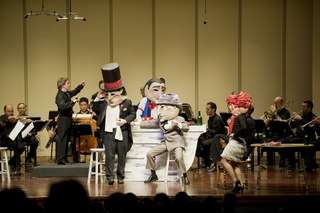|
Back
When American Culture First Crossed the Pond Chicago
Martin Theatre
07/27/2010 -
Erwin Schulhoff: Etudes de Jazz, WV 81 (*)
Wilhelm Grosz: Afrika Songs, Op. 29 (#)
Darius Milhaud : Le Bœuf sur le toit, Op. 58 (+)
Di Wu (piano) (* #), Ronnita Miller (mezzo) (#), Brian Mulligan (baritone) (#)
Chicago Chamber Musicians, James Conlon (conductor) (# +)
T. Daniel and Laurie Willets (Direction & Choreography) (+)

(© Russel Jenkins/Ravinia Festival)
A Ravinia evening celebrated European fascination with things American after the First World War. At the beginning of the US’s 100-year ascendancy to superpower status, European composers caught on to our lively American culture and began to engage us across the seas. James Conlon, the multi-tasker who is Ravinia’s music director, introduced two unfamiliar but clearly deserving composers and performed Darius Milhaud’s small gem, Le Bœuf sur le toit. With a light touch, he educated us about the arrival of jazz in Europe with the American troops.
Pianist Di Wu opened the evening with a charming rendition of Erwin Schulhoff’s Etudes de Jazz. Schulhoff, a Czech Jew who died in a concentration camp, wrote jazz before Gershwin and “silence” before John Cage. (His rest is to be performed “with feeling.”)
After European classical musicians heard jazz, they quickly incorporated its spirit and style into their music. Wu performed a Schulhoff Charleston and Tango with such aplomb that jazz's contagion across the world was easy to understand. From a consummate technical base, she flew away, capturing the spirit Schulhoff described in a letter to Alban Berg: “I have a tremendous passion for the fashionable dances and there are times when I go dancing night after night with dance hostesses purely out of rhythmic enthusiasm and subconscious sensuality; this gives my creative work a phenomenal impulse, because in my consciousness I am incredibly earthly, even bestial.”
Composer Wilhelm Grosz was intrigued by a volume of poetry by the Harlem Renaissance poets published in the late 20’s. Featuring Langston Hughes, Grosz used a German translation to set his Afrika songs. “Yo” becomes something like “ihre.”
Summertime brings out the best of young talent and the rich performance of Grosz songs was no exception. Mezzo soprano Ronnita Miller, and baritone Brian Mulligan, singly and together, performed with command and feeling. Miller’s voice is powerful and expressive. She sustains a wide dynamic range while hitting notes clearly and accurately. Mulligan is a full-bodied baritone with a ringing tone and a dramatic spark. Conlon conducted an expanded chamber orchestra, which included brass, strings, two pianos, celeste, glockenspiel, harp and banjo. These songs sounded like Kurt Weill, but are more romantic. They certainly deserved a re-visit, so lush and lovely in the evening’s performance.
Nazis didn’t like either jazz or Jews so Grosz was forced to move to England. Failing to draw the interest of music publishers to his serious music, he successfully adapted to the conditions of London’s Tin Pan Alley, writing a number of highly popular songs, such as Isle of Capri, Red Sails in the Sunset and Harbor Lights. He finally decided to try composing for Hollywood, but died in New York on his way to the West Coast.
Darius Milhaud also had film on his mind when he completed Le Bœuf sur le toit, the evening’s third presentation. Le Bœuf sur le toit doesn’t sound very American, but the accompanying pantomime certainly is.
Milhaud thought Le Bœuf sur le toit could provide music for Chaplin’s silent films, a complement to Charlie with his bamboo cane, baggy pants and oversized shoes, his strange little skips and perpetual frenzy of motion. The brash music hall sonorities and raw polyphony of Milhaud’s music never relax. Fast tangos alternate with roughly strummed maxixes. The chamber orchestra’s first violinist had a ball, whether he was performing, or just keeping the beat with his head, his eyebrows, or his toes.
When Milhaud discussed a theatrical accompaniment with Jean Cocteau, Cocteau imagined an American bar during prohibition. For this Ravinia production, T. Daniel created a pantomime following Cocteau’s guidelines. In contrast to the exuberant rondo that zips along, the actor’s movements are in slow motion, the characters defined in part by their huge papier mâché head masks.
Conlon came into the stage bar for a drink before the orchestra entered and he left for his day job conducting. The rondo romp was enchanting. Milhaud had written: “Still haunted by memories of Brazil, I assembled a few popular melodies, tangos, maxixes, sambas. and even a Portuguese fado, and transcribed them with a rondo-like theme recurring between each two of them. I called this fantasia: Le Bœuf sur le toit, the title of a popular Brazilian song. I thought the character of the music might make it suitable for an accompaniment to one of Charlie Chaplin's films. Cocteau disapproved of my idea. He produced a pantomime scenario that could be adapted to my music. He imagined the scene set in an American bar during prohibition.”
Watching and listening to Le Bœuf sur le toit in full orchestration with an approximation of Jean Cocteau’s original pantomime was great fun. T. Daniel created masks, which in their Ravinia incarnation looked like the work of James Ensor. Raoul Dufy had designed the original costumes and décor (not on view). Cavorting across the stage, jumping up like frogs, this evening’s cast exhibited the childlike sense of wonder that transforms a whole world into a plaything. The original cast had been the Fratellini family of clowns. Deeply immersed in the world of fantasy, the audience was captivated.
When Le Bœuf played at the Ba-Ta-clan music hall in London, it was sandwiched between Japanese acrobats and Ruth Draper’s sketches. One night Cocteau heard a member of the audience say to his wife: “It ain’t that it makes you laugh; but it’s different, see, so it makes you laugh.” Indeed!
Susan Hall
|